SSI 2.0 Conference
Traditional Knowledge Meets Modern Science
Traditional agriculture in the fullest sense involves sustainable seed innovation.
Historically farmers selected the best seeds, saved them from one season to another and exchanged seeds with other farmers. Periodically new varieties developed through this system of cultivation, seed selection, and exchange. India's incredible agro-biodiversity is not just due to environmental conditions, but also the innovation of farmers over thousands of years.
Sustainable seed innovation requires: i) the conservation of traditional varieties and ii) farmer innovation of new varieties through seed selection. Genetic material can be preserved through seed banks (ex-situ conservation), while cultivation of traditional varieties ensures continual adaptation to local conditions (in-situ conservation). Groups supporting traditional agricultural practices and the farmers following these practices have achieved the first step of sustainable seed innovation. The second step of innovating new varieties happens less often and does not receive the recognition and encouragement deserved.
How can policy in India incentivise sustainable seed innovation?
Following-up on the SSI 1.0 round-table, this event continues to engage stakeholders in answering this question, while also recognising the need to refine policy actions over time.
For instance, the main focus of SSI 2.0 is to make the multiplication of indigenous seeds profitable and sustainable, through the use of Digital Ledger Technology.
The Sustainable Seed Innovation project team introduced the vision behind the Position Paper, outlining a path for policymakers eager to encourage small farmers in India to grow and sell native indigenous seeds of cultivated varieties. Participants discussed next steps for policymakers after adoption of the Position Paper's recommendations. The event may be viewed via the Art of Living YouTube channel. Updated versions of the paper are available via ResearchGate.
Program for the 30th of July, 2019
Keynote speaker: Sri Sri Ravi Shankar (via Skype)
9:30 am to 10:00 am: Welcome and Introduction
Welcome from the Art of Living Foundation (Rugmani Prabhakar)
Welcome from the University of Leeds (Dr Natalie Kopytko)
Introduction of the conference theme and background (Prof Gregory Radick)
10:00 to 11:30 am
Plenary discussion of future proposals for all three prongs.
11:30 am to 11:45 am: Coffee Break
11:45 am to 1:00pm
Farmers' Stories: shared by Natalie Kopytko and farmers in attendance.
1:00 to 2:15 pm: Lunch
2:15 on to 3:30 pm: Position paper presentations
Prong 1 Reviving TEK-based Farming Systems (Dr Prabhakar Rao and Julia Koeninger)
Prong 2 Re-designing Agricultural Education and Extension (Prof Gregory Radick)
Prong 3 Re-thinking ‘value’ and ‘incentives’ for Sustainable Seeds Research and Innovation (Dr Mrinalini Kochupillai)
3:30 to 3:45 pm
Summary of the plenary session (Dr Prabhakar Rao and Julia Koeninger)
3:45 to 4:15 pm
Responses by Shri AP Singh, Advisor (Agriculture) Niti Aayog and Dr Ashish Bhutani – Joint Secretary (Credit), Ministry of Agriculture
4:20 to 5:00 pm: Conference Closing
Handing Over of Position Paper, Presentation of Certificates, and Vote of Thanks
Photo Gallery (courtesy of Art of Living)
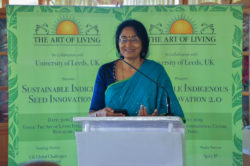
Welcome from the Art of Living (Rugmani Prabhakar).
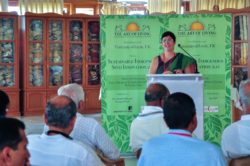
Welcome from University of Leeds (Dr. Natalie Kopytko).
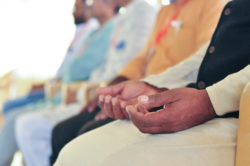 Om to start the day.
Om to start the day.
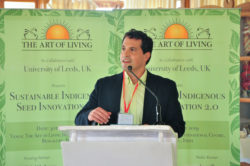
Project Introduction (Prof Gregory Radick).
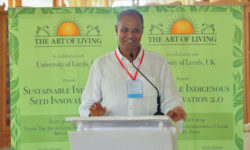
Event chair from the Art of Living (Dr. Prabhakar Rao).
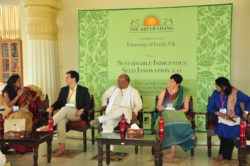
Plenary discussions.
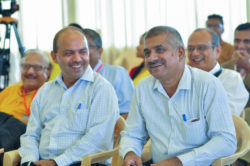
Shri AP Singh and Dr Ashish Bhutani.
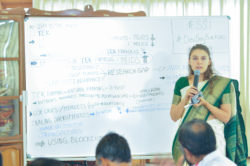
Notes captured during plenary (Julia Koeinger).
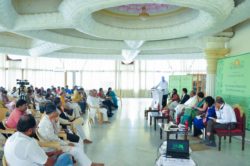
Conference participants in discussions.
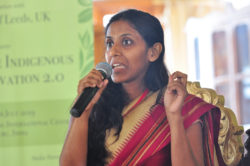
Presenting prong 3 (Dr. Mrinalini Kochupillai).
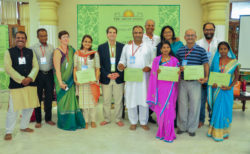
Farmers receiving certificates.
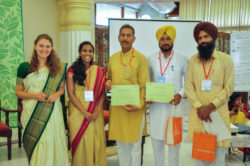
Farmers from Punjab receiving certificates.
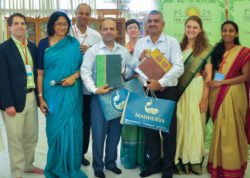
Project Team with Shri AP Singh and Dr Ashish Bhutani.
See the press release for this event.
